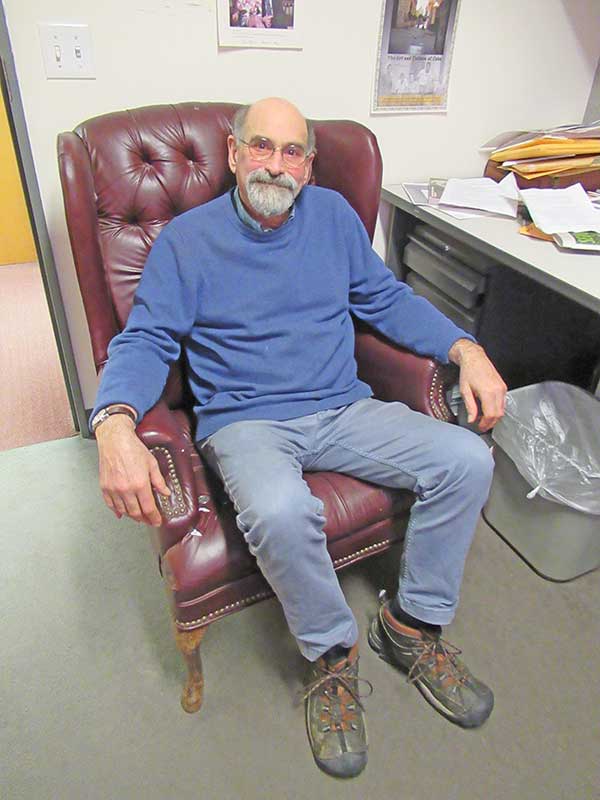February Cuba trip cancelled
Tyrone Shaw
Much to the disappointment of Professors Tyrone Shaw and Ken Leslie, as well as students hoping to attend, their exciting endeavor to Cuba next semester has been cancelled. For the first time in four years there weren’t enough students signed up for the course to run. “By Oct. 30th, which was our cutoff date, we only had four people really committed to the course, and that is way below the minimum number we would have needed to make this work,” said Shaw, associate professor in the writing and literature department.
Leslie, professor and chair of fine arts, noted that for the 2016 trip they had too many students applying.
Neither professor is certain of what went wrong this time, but both of them have a few suspicions. “Number one, there was a state department advisory about travel to Cuba,” said Shaw. “I don’t know if that had any implications on this or not. It certainly didn’t help.”
The warning he was referring to was issued by the Bureau of Consular Affairs and states: “Over the past several months, numerous U.S. Embassy Havana employees have been targeted in specific attacks…Affected individuals have exhibited a range of physical symptoms including ear complaints and hearing loss, dizziness, headache, fatigue, cognitive issues, and difficulty sleeping.”
Leslie is skeptical about the warning being responsible for a lack of participants. “I mean, maybe something like that happened, but that’s not on the streets of Cuba or every Cuban would be affected by it,” he said. “So that’s a very unlikely scenario.”
Although the trip was advertised the same amount as previous years, Shaw admitted that they hadn’t printed the course in the 2018 catalogue.
“That might’ve been a problem as well, and other than that, I don’t know,” he said. “I know a lot of people expressed some interest in going, but financial problems precluded that even though we did have some scholarship money available.”
The trip would have cost $2100, which is a slight increase in price from the previous Cuba trips due partly to higher airfare costs. “Airfares have become a little more crazy now with four American carriers going to Cuba…it has gone up about 20 percent,” said Shaw. However, courses with a much higher cost have been met with overwhelming attendance. Leslie said, “Last year we had 16 students come with us to New Zealand, and that trip was literally twice the price.”
Leslie suspects that competition with other trips may have led to the Cuba trip’s demise. “There are more and more travel opportunities that students are taking, therefore maybe there’s fewer this time around that were interested in Cuba,” he said.
This very well may be the case as LSC Professor Alexandre Strokanov is running two trips around the same time as Leslie and Shaw’s trip would have taken place, both of which cost $3,000-$3,550.
JSC Professor of Environmental and Health Sciences Brad Moskowitz is also running a February break trip that is completely full.
The cancellation of the Cuba trip could have been caused by a mix of all of these factors, or this year could simply have been a fluke.
Regardless of the reason, Leslie and Shaw are not giving up. “He and I will have to conspire to get the critical number of people,” said Leslie.
Shaw already has some ideas on how to accomplish that. “For one thing we can plaster it all over the moodle site, the way, for instance, Professor Strokanov is doing his, that we really can hit both Lyndon and Johnson a lot harder,” he said. “I could send in a mass email out the way that Bob Genter, for instance, did with his Yellowstone class. Next time we’ll be a lot more aggressive about promoting this trip.”
Even though the course has collapsed, Shaw is going to travel to Cuba during February break anyway to work on the Cuba Project that started last fall. He’s planning on meeting with University of Havana Professors Rafael Betancourt and Consuelo Martin Fernendez, who visited JSC a few months ago, and is hoping to make more contacts within the university. “What we’re hoping to work toward is picking up where Burlington College left off with a semester in Cuba option for students,” he said. “That’s going to require a bit of advance work. So, I don’t want the cancellation of the Cuba trip to derail the long-term projection we have for a sustained relationship with Cuban institutions and the country itself.”
Shaw also noted that he would also be busy strethgening links already established between San Alejendro Academy, Cuba’s premier high-school arts academy and JSC. “We’ve developed a very warm relationship with that institution,” said Shaw. “And we ought to keep that going.”
He also hopes to lay the groundwork for two additional visits from Cuba: Pedro Diaz Rodriguez, who manages a Salsa Dance tour company in Havana, and two instructors from the highly regarded Taller Experimental Grafica cooperative, who would come to NVU as visiting artists.
“Of course, it’s a shame that we aren’t running the Art and Culture of Cuba class this February, but we can at least take this opportunity to keep the momentum up as we forge closer ties to the amazing country,” said Shaw. “We’ll find the silver lining in all of this, I’m sure.”




Brenda Priddy • Nov 30, 2017 at 3:10 am
I’m not sure how many students you needed for this trip, but perhaps I can help you if you still wanted a small group to travel to Cuba in February. We work with groups as small as 6 to 10 people! Let me know if I can be of any assistance.